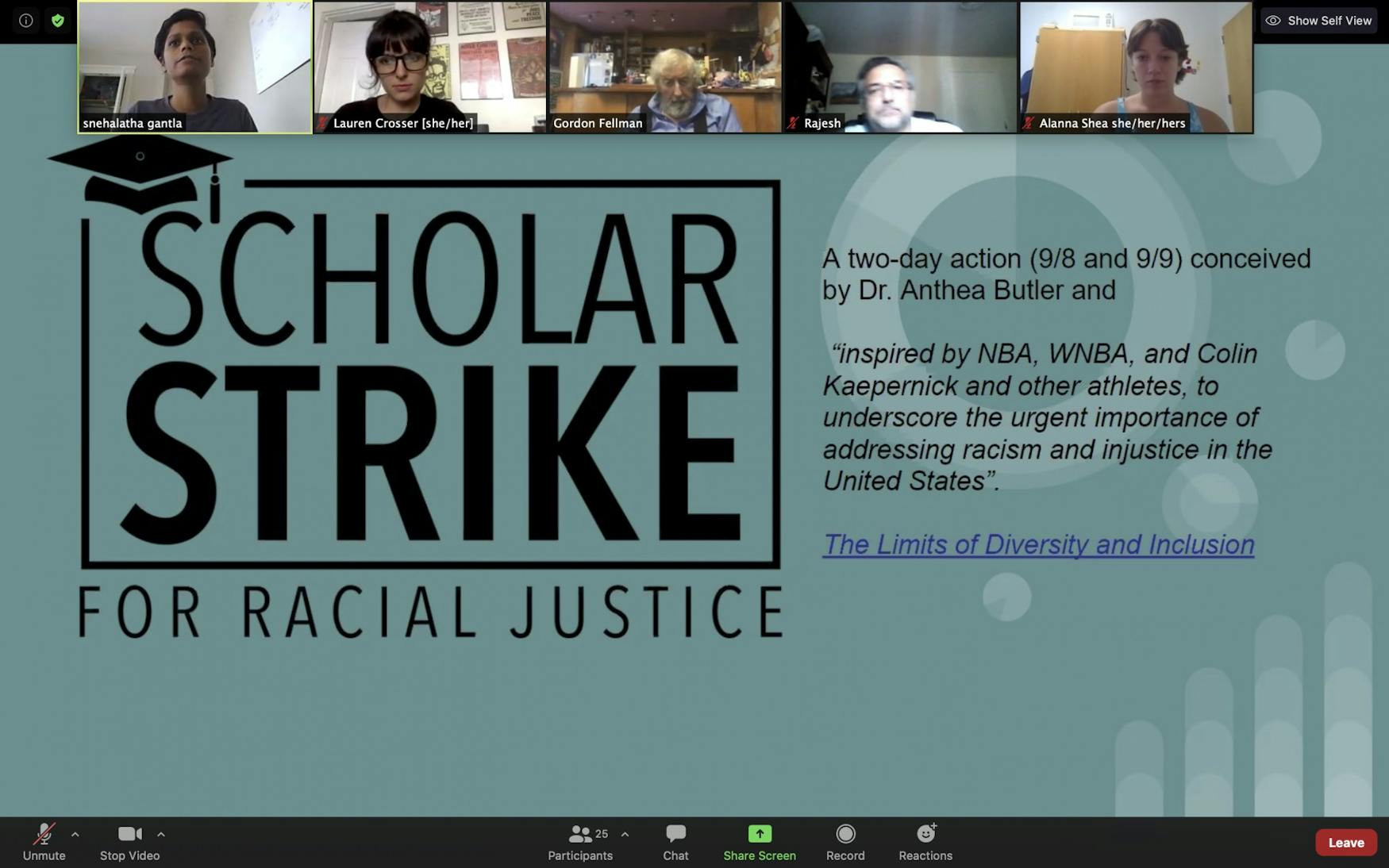Students and faculty met to create action plans to address racism
Brandeis community members examined higher education’s role and responsibility in protesting and addressing racial and anti-Black violence
Students and faculty met in a virtual assembly to discuss the ways that Brandeis and other higher education institutions are implicated in the continuation of racism, racist practices and racist policies. The assembly, hosted by graduate students of the Sociology Department on Sept. 9, was facilitated by Ph.D. students Sneha Gantla and Lauren Crosser.
The event began with the viewing of a video on the African American Communication and Culture #ScholarStrike Conference Youtube page made by Former Vice Provost and Prof. Emeritus at the University of Pittsburgh Jack L. Daniel, Ph.D. “In my opinion, diversity and inclusion is the last of several flawed paradigms related to the Black struggle for freedom, equity and equality,” Daniel said.
Black people are struggling for their lives, not for diversity and inclusion, according to Daniel. Using an analogy where a white, Scandanavian male teacher is considered in the context of different groups, Daniel explained how virtually anything in the right conditions can technically be diverse. So, rather than focusing on diversity and inclusion — an idea crucial to Brandeis’ curriculum and outlook — Daniel urged people to instead focus on systemic racism, injustice, COVID-19 and equity.
Organizers then transitioned into the reading of select quotes from Brandeis Alumna and political activist Angela Davis ’65 that asked where the “justice” is in conversations about diversity. Gantla criticized the recent recognition of Davis by the University in her role as one of the keynote speakers for the 2020 graduating class. “I genuinely cackled,” Gantla said of reading the University’s response to Davis’ recent remarks on racial justice and racially-informed education. “They’ll advertise you [when you succeed], but they won’t make space for you and what you stand for.”
The organizers of this event stressed that although Brandeis is thought of as a “liberal institution,” there is “blood in its history,” and that universities must be implicated and held to the same standard as any other institution. “An anti-racist society demands an anti-racist university and education,” Gantla said.
The attendees then divided into small groups where they discussed the material from Davis and Daniel and worked to create action plans for Brandeis. Participants then regrouped to discuss their findings. For each of these discussions, Crosser encouraged “nonhierarchical discussions” in which the group tried to make space for the people whose voices are not as amplified in other settings, like in the case of students (especially students of color) versus faculty.
Two students who asked to remain anonymous due to the sensitive nature of the topic opened up the group discussion with a look into Brandeis’ LITdogma — Love, Inclusion and Trust. These students acknowledged the performativity of this policy, as well as the diversity requirements currently in place. These policies provide an answer without fully addressing or taking responsibility for their role in perpetuating systematic and institutionalized racism. Gantla added to this, explaining that the LIT policies are focused on individual actions, and asking what can be the equivalence of LIT policies on an institutional level? She explained that individual action is often emphasized as a solution within “a system that doesn’t allow your response,” if you represent a marginalized voice within the community.
Rachel Wang ’21 then discussed the use of acronyms as a tactic to reduce certain concepts into things “you can put into your pocket to perform or demonstrate something.” Wang explained, “When you’re feeding this [LIT] acronym to these incoming freshmen and [not asking] ‘where is the justice in that?’ diversity and inclusion is coded … and used to stall and not perform any action that is justice-oriented.”
Prof. of the Philosophy of Justice, Rights and Social Change Rajesh Sampath (Heller) discussed his perspective as a faculty member of color in the fight for justice. He explained that the commodification and representation of Black and Brown faculty for public relations purposes is “revolting,” especially since faculty members of color are shouldering the burden of racism and correcting racism. In a Sept. 18 email to the Justice, Sampath clarified that he was speaking not about Brandeis specifically, but about higher education in general. He added that Brandeis had also taken some steps to recruit and diversify faculty, as well as making leadership opportunities available to them.
Sampath continued in the Sept. 9 event that informed dialogues about anti-Black racism and the like have not occurred at the administrative and faculty levels due to a sheer lack of faculty of color who can speak to racism in an “authentic way.”
“I’m looking forward to shaking this down to the ground for as long as I’m here,” Sampath said. “White supremacy is inside the structure, not a microcosm.” He clarified in another Sept. 18 email to the Justice that he was again referring to higher education as a whole, not to Brandeis.



Please note All comments are eligible for publication in The Justice.